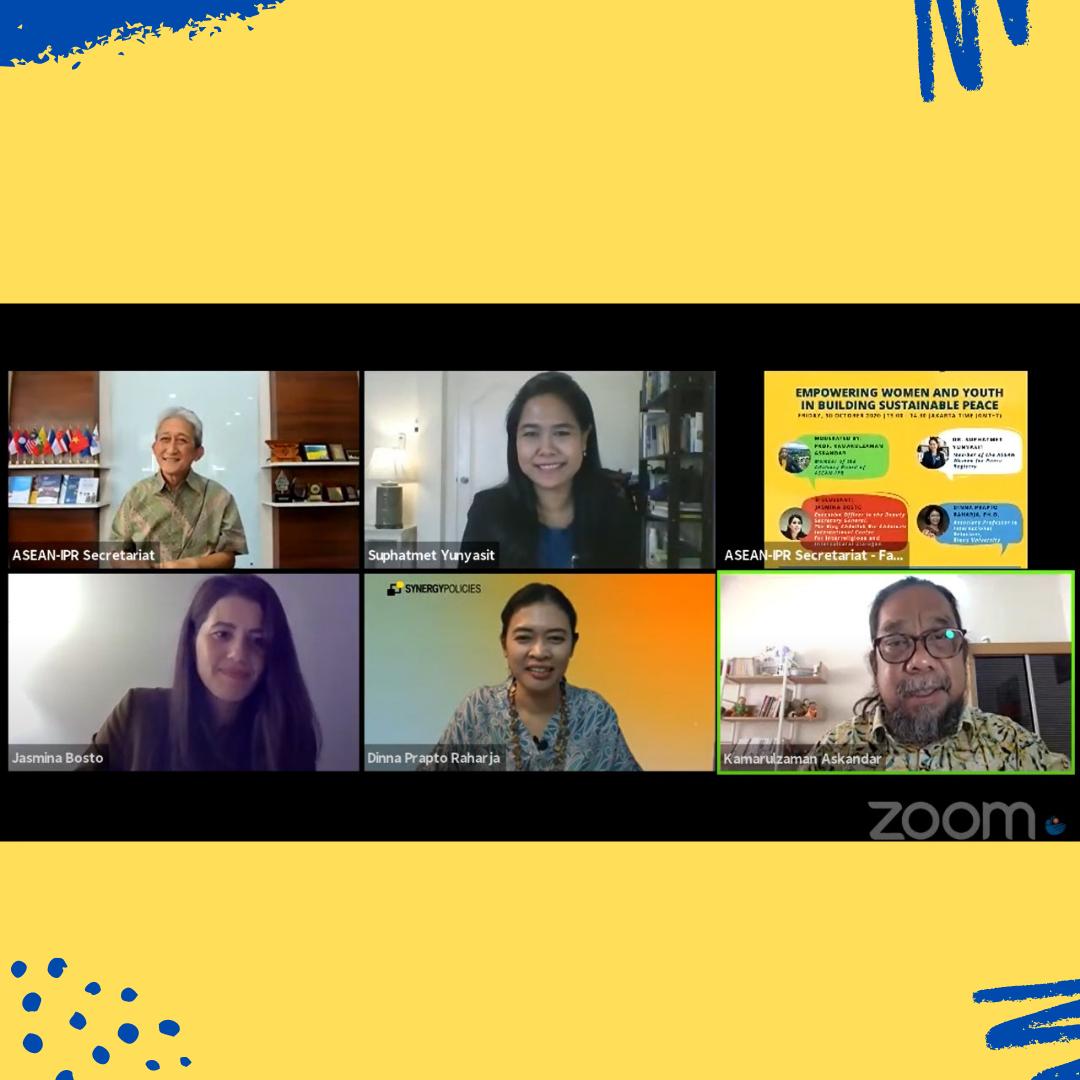ASEAN-IPR Discussion Series: Empowering Women and Youth in Building Sustainable Peace
ASEAN-IPR UPDATE
ASEAN INSTITUTE FOR PEACE AND RECONCILIATION DISCUSSION SERIES:
EMPOWERING WOMEN AND YOUTH IN BUILDING SUSTAINABLE PEACE
Friday, 30 October 2020
The ASEAN Institute for Peace and Reconciliation (ASEAN-IPR) convened a Webinar on 30 October 2020, taking on the theme “Empowering Women and Youth in Building Sustainable Peace.” This Webinar was the fifth part of the ASEAN-IPR Discussion Series, that brought together participants coming from ASEAN Member States (AMS), ASEAN bodies/sectoral bodies/centres/entities, ASEAN’s partners, civil society groups, as well as other stakeholders – whether through the Webinar platform, or through the Institute’s YouTube Channel.
The theme of the Webinar aims to explore the linkage between empowering women and youth and building sustainable peace. It also aims to see how it can be implemented through dialogue between and/or amongst women and youth as part of building sustainable peace. Overall, the Webinar aimed to explore how dialogues can foster not only understanding and tolerance but also embrace diversity amongst different groups in the framework of building sustainable peace.
The discussion was moderated by Prof. Kamarulzaman Askandar, the Malaysian Representative to the Advisory Board of the ASEAN-IPR. Two Speakers shared their views on the topic: Dr. Suphatmet Yunyasit, Thailand Member of the ASEAN Women for Peace Registry (AWPR) and Dinna Prapto Raharja, Ph.D., an Associate Professor in International Relations at Binus University, as well as the Indonesian Representative to ASEAN Intergovernmental Commission on Human Rights (AICHR) 2016-2018. Representing the King Abdullah Bin Abdulaziz International Centre for Interreligious and Intercultural Dialogue (KAICIID), Ms. Jasmina Bosto participated as a Discussant.
Dr. Suphatmet Yunyasit kicked start the discussion by emphasising how women plays a key role in the society. Whether within the families, or taking an active part in the economic growth, women are assigned to many different roles. Nevertheless, women participation in decision-making processes is still lacking, with the process being commonly male dominated—an indication that gender inequality still exists. On the other hand, youth would often experience being side-lined by elders, due to the perception that youth’s behaviour does not meet the standards set by elders.
Dr. Dinna Prapto Raharja explained that in the framework of building a sustainable peace, it is necessary to be more insightful towards the dominating perspective of building peace. In addition to having norms permeating into laws or policies, dialogues at macro levels, sharing best practices for policy reform, and having the institutions to spearhead peace efforts; it is equally important to contextualise these dominating perspectives. Specifically, there is a need to fully comprehend the pre-conditions of society and its structural circumstances. Furthermore, one should also build a strong connection between competencies, skill, and willingness of the agents of change. Lastly, opportunities should be built to participate in shaping reform or change.
Sharing views as Discussant, Ms. Jasmina Bosto explained that dialogues—whether that be interreligious or intercultural—are structured engagement with people from different identities and background. A successful dialogue requires the willingness to listen, cooperate, and mutual respect.
A key added value of dialogue is that it is people-centred, and therefore may help with social healing and inclusion. Dialogue can also be transformative, as it can gather diverse actors and engage in collective decision-making process. Reiterating the previous Speakers, women and youth are more often seen as victims, as opposed to stakeholders, especially in the context of creating solutions. In effect, this perception places women and youth as only the recipients of the solutions; where in fact, seeing these groups as stakeholders could potentially create a more sustainable peace. It means that women and youth must also be included in the design and implementation of solutions.
To catch the full discussions of the Webinar, please visit ASEAN-IPR’s YouTube Channel, or refer to the following link: http://tiny.cc/asean-iprwebinarseries.
*******

